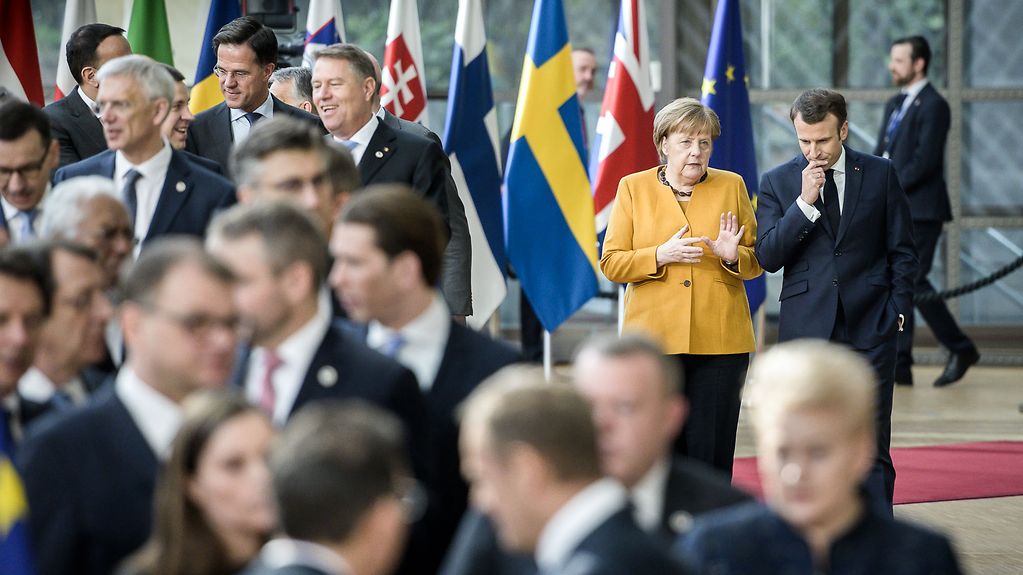European Council spring meeting
Clear agreement at the Brussels European Council meeting – the heads of state and government approved an extension of the Article 50 process, and laid out two conditional options for the United Kingdom. Other spotlights of the summit meeting included the EU’s relations with China and European industrial policy.

Chancellor Angela Merkel with French President Emmanuel Macron in Brussels
Photo: Bundesregierung/Denzel
In dealings with the United Kingdom, declared Chancellor Angela Merkel following the spring summit meeting in Brussels, the EU27 have once again demonstrated that "we can act together with great unity". A disorderly withdrawal at the end of March "has been prevented for the time being".
Brexit – two extension options
On Wednesday, Prime Minister Theresa May wrote to the EU requesting an extension of the withdrawal date until 30 June. The EU27 offered the UK two options for delaying the country’s departure:
- If the UK parliament approves the withdrawal agreement within the next week, the European Council will grant an extension until 22 May. This date lies immediately before the elections to the European Parliament, which will be held across Europe between 23 and 26 May.
- Should this not be the case, the European Council will grant an extension until 12 April. The UK will be expected to produce a clear roadmap indicating the way forward. The 12 April was selected to give the UK time to make preparations to take part in the European elections if necessary.
After the European Council meeting the Chancellor said, "We will now see what the UK parliament decides. For the time being we have prevented a disorderly departure on 29 March." The deadlines set are short, however, and the UK will have to make it clear "how it intends to proceed".
"We are prepared for all scenarios," stressed Chancellor Angela Merkel on Thursday evening after the Council’s deliberations. "We would still like to see an orderly departure of the United Kingdom from the European Union, but we must now prepare for other options, to ensure that they are acceptable for the people in Europe."
Relations with China: fundamental concept of reciprocity
Another focus of the meeting was the EU’s relations with China, with a view to preparing for the EU-China summit, scheduled for 9 April 2019.
All in all, stressed the Chancellor, the EU would like to maintain "good and intensive trading relations with China". The EU and China are "partners" and "competitors" with "very different political systems". One fundamentally important idea in the discussion was, she reported, that the EU would like to see relations with China "based on the principle of reciprocity".
The main issue here is to achieve equal entitlements regarding access to markets. Chinese business investing in Europe and European businesses investing in China should enjoy the same conditions.
The European Commission and the High Representative for Foreign Affairs and Security Policy had reviewed relations between the EU and China and proposed ten action points. The European Council noted this document with approval.
Strengthening European industry
In response to an initiative of Germany and France, the European Council discussed European industrial policy. The European Commission has been instructed to propose an industrial strategy with concrete measures by the end of 2019.
This is to embrace trading issues and ways of dealing with technological transformations, as well as examining how better to anchor new data-based business models in the EU. The strategy will also include climate action and ways of reducing CO2 emissions.
Industry in Europe is key to prosperity and secure jobs in all member states, also and particularly in Germany. It is a question of forward-looking branches of industry such as electric mobility and artificial intelligence. To strengthen European industry in the face of global competition, the EU is developing common strategies.
Additional information on European industrial policy and EU activities to date in the field of industrial policy.
Other points on the agenda:
- On climate action the European Council looked at the EU’s long-term strategy, which it must present at the start of 2020 in line with the provisions of the Paris Agreement.
- The heads of state and government also considered ways of tackling disinformation. This is important, in particular, with a view to the European elections.